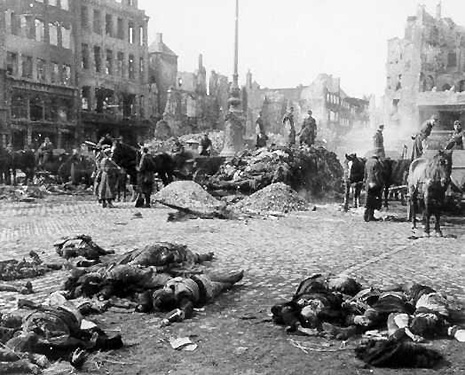In consideration of the continuing pitiless assaults against Gaza and its captive residents by Israel abetted by the U.S. and the looming threat of an uncontrolled wider regional conflict it is time to recall again one of the first mass bombings of a civilian population center with little or no military significance in history. German and Italian war planes bombed the market town of Guernica, a Basque village in northern Spain on April 26, 1937. The atrocity, an episode of the Spanish Civil War—a dress rehearsal for World War II—outraged world opinion at the time.
The dead in Guernica.
Within weeks Spanish expatriate painter Pablo Picasso in Paris was commissioned by the Republican Government for a display at the Exposition Internationale des Arts et Techniques dans la Vie Moderne at the 1937 World’s Fair in The City of Light. Picasso’s huge, dramatic monochromatic black, gray and white painting became an international sensation and anti-fascist icon. It toured the world and survived the Blitz in London.
When the United Nations opened its new headquarters in New York City, a full-size tapestry reproduction was hung on a wall outside the entrance to the Security Council Chambers to remind the delegates and diplomats that their mission was to make a world where atrocities like Guernica are impossible.
Pablo Picasso's Guernica perhaps the most important painting of the 20th Century and certainly the most representative of that blood drenched age.
On February 4, 2003 United States Secretary of State Colin Powell addressed the Security Council laying out America’s case for going to war against Iraq. A press conference followed outside the chambers. When reporters assembled they found the famous Guernica tapestry covered by blue curtains. Officially the United Nations claimed it was in preparation for painting and renovation. Some reporters were told that TV news crews had complained that the stark images distracted from the speakers in front of them.
No one honestly believed either story. The picture had been masked to avoid embarrassing Powell and the Bush Administration which was preparing to launch their announced campaign of shock and awe which would include bombing Baghdad and inevitably cause civilian casualties.
That is the moment that New York born poet Gregg Mosson captured in his piece A World Without Picasso’s Guernica which was included in the 2007 anthology Poems Against War: Bending Toward Justice.
Painting representing Guernica being covered for Colin Powell's United Nations press conference.
Mosson was a former reporter and commentator whose work has appeared In The Cincinnati Review, The Baltimore Sun, The Oregonian, The Baltimore Review, and The Futurist. His poetry has appeared in many small-press journals. He earned his MA from the Johns Hopkins Writing Seminars, where he was a teaching fellow and lecturer. He has authored two books of poetry, Season of Flowers and Dust in 2007 and Questions of Fire in 2009. Mosson was a contributing poetry editor at The Baltimore Review.
A World Without Picasso’s Guernica
February 5, 2003
At the United Nations, blue drapes sheath
a tapestry rendition of Guernica, so speakers can paint
blitzkrieging dreams, burying screams affixed and aired;
killing machines can work again.
Who expunged Guernica from the U.N.,
and then did U.N. walls tremor
down to their foundation
in the “war to end all wars”
and covetous twentieth century?
Yesterday, today, or tomorrow
bombs drop and discombobulated body parts
hurl through the air, and brown limbs
burst from horses
and spin past a still-standing bystander
dumbstruck
as infernos smoke and buildings crumble.
—Gregg Mosson
Scottish poet Sheena Blackhall captured the horror of the bombing itself. Blackhall was born in Aberdeen in 1947 and is a poet, novelist, short story writer, illustrator, traditional story teller, and singer. She has written over 100 poetry pamphlets—chapbooks we call them this side of the Pond—12 short story collections, 4 novels and 2 televised plays for children.
Guernica
Most of the
men off fighting in Civil War
Our women and children haggling over bargains.
And then three hours bombardment from the skies
Like a place of card, our town, stamped on by giants
Those who hid in the fields were soon machine gunned.
The wooden walls of our homes, a red inferno
Wives wailed over the dead, blown up by shrapnel
Horses and bulls lay crushed by masonry.
Doves flew in all directions, panic-stricken.
I ran wildly ahead towards a bomb hole
Dived inside the churned up, muddy crater.
Bullets ricocheted, and cars exploded
Riddled corpses leaked blood on the streets
Children huddled round a parish priest
Too shocked to speak. In tatters, every one
The Plaza was a wall of living flame,
All that was left, a church, a tree, a factory
Charred bodies will forever haunt my dreams.
And this was how war came to Guernica
—Sheena Blackhall






